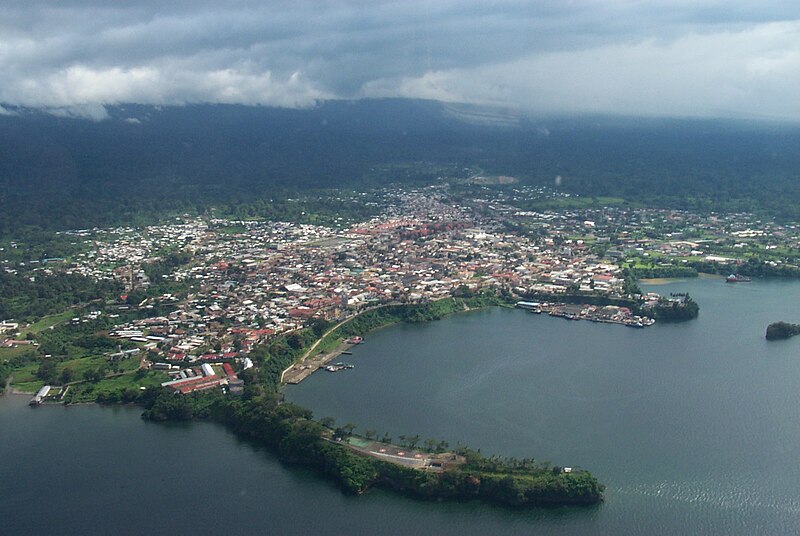Difference between revisions of "About Equatorial Guinea"
(Created page with "{{#eimage:http://upload.wikimedia.org/wikipedia/commons/thumb/9/95/Malabo_a_13-oct-01.jpg/800px-Malabo_a_13-oct-01.jpg|410x579px|thumb|'''Aerial view of city of Malabo.'''<BR/...") |
m |
||
| Line 4: | Line 4: | ||
[[Equatorial Guinea]] gained independence in 1968 after 190 years of Spanish rule. This tiny country, composed of a mainland portion plus five inhabited islands, is one of the smallest on the African continent. President Teodoro Obiang NGUEMA MBASOGO has ruled the country since 1979 when he seized power in a coup. Although nominally a constitutional democracy since 1991, the 1996, 2002, and 2009 presidential elections - as well as the 1999, 2004, 2008, and 2013 legislative elections - were widely seen as flawed. The president exerts almost total control over the political [[system]] and has discouraged political opposition. [[Equatorial Guinea]] has experienced rapid economic growth due to the discovery of large offshore oil reserves, and in the last decade has become Sub-Saharan Africa's third largest oil exporter. Despite the country's economic windfall from oil production, resulting in a massive increase in government revenue in recent years, improvements in the population's living standards have been slow to develop. | [[Equatorial Guinea]] gained independence in 1968 after 190 years of Spanish rule. This tiny country, composed of a mainland portion plus five inhabited islands, is one of the smallest on the African continent. President Teodoro Obiang NGUEMA MBASOGO has ruled the country since 1979 when he seized power in a coup. Although nominally a constitutional democracy since 1991, the 1996, 2002, and 2009 presidential elections - as well as the 1999, 2004, 2008, and 2013 legislative elections - were widely seen as flawed. The president exerts almost total control over the political [[system]] and has discouraged political opposition. [[Equatorial Guinea]] has experienced rapid economic growth due to the discovery of large offshore oil reserves, and in the last decade has become Sub-Saharan Africa's third largest oil exporter. Despite the country's economic windfall from oil production, resulting in a massive increase in government revenue in recent years, improvements in the population's living standards have been slow to develop. | ||
| − | Source: | + | Source: www.cia.gov/library/publications/the-world-factbook/geos/ek.html |
Back to [[Adopting from Equatorial Guinea]] | Back to [[Adopting from Equatorial Guinea]] | ||
Latest revision as of 01:46, 25 March 2018
Equatorial Guinea gained independence in 1968 after 190 years of Spanish rule. This tiny country, composed of a mainland portion plus five inhabited islands, is one of the smallest on the African continent. President Teodoro Obiang NGUEMA MBASOGO has ruled the country since 1979 when he seized power in a coup. Although nominally a constitutional democracy since 1991, the 1996, 2002, and 2009 presidential elections - as well as the 1999, 2004, 2008, and 2013 legislative elections - were widely seen as flawed. The president exerts almost total control over the political system and has discouraged political opposition. Equatorial Guinea has experienced rapid economic growth due to the discovery of large offshore oil reserves, and in the last decade has become Sub-Saharan Africa's third largest oil exporter. Despite the country's economic windfall from oil production, resulting in a massive increase in government revenue in recent years, improvements in the population's living standards have been slow to develop.
Source: www.cia.gov/library/publications/the-world-factbook/geos/ek.html
Back to Adopting from Equatorial Guinea
